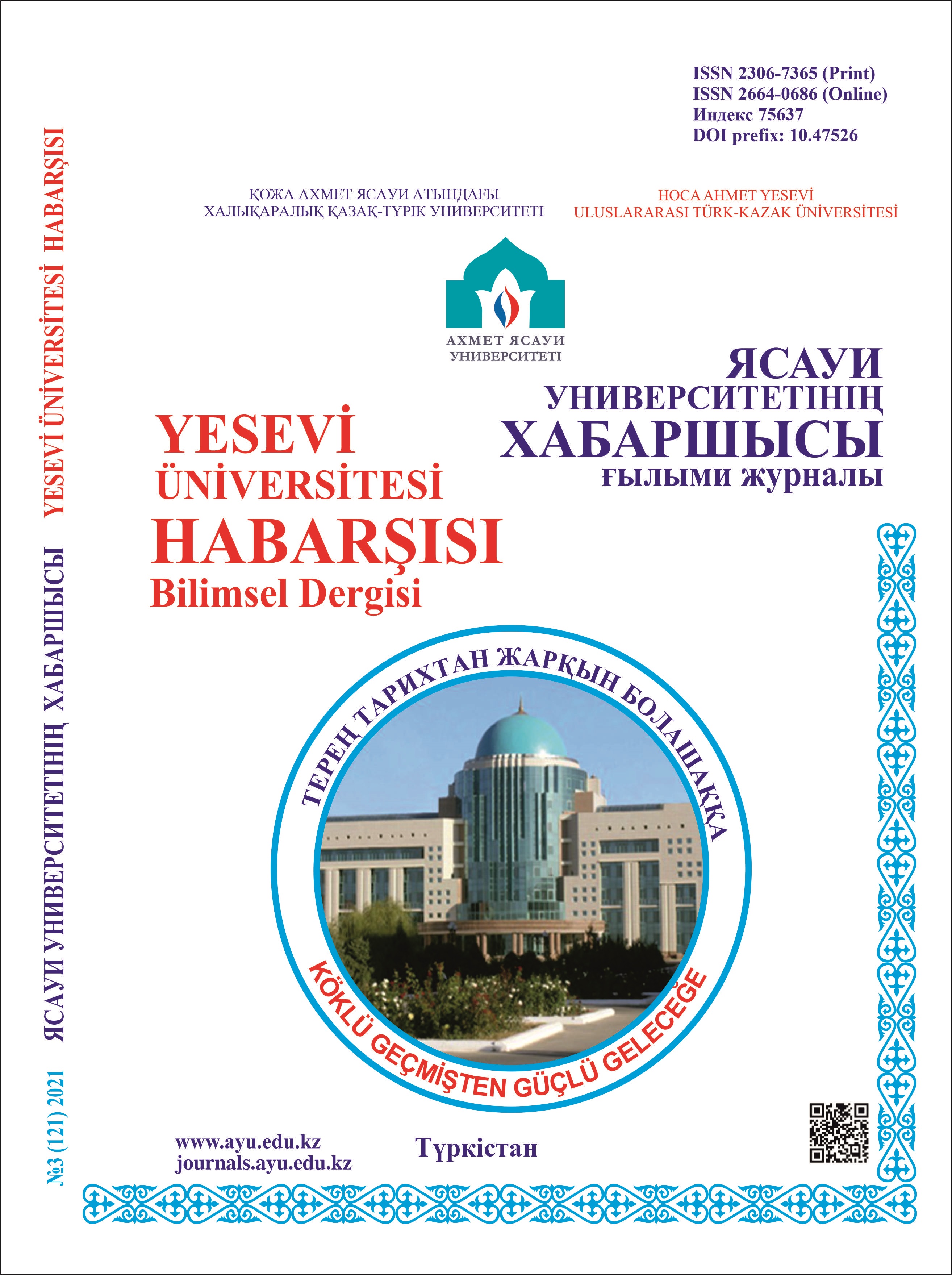Изучение предметов литературоведения с помощью технологии критического мышления
262 293
Ключевые слова:
технология критического мышления, теория литературы, эстетика, мыслительная активность, компетентность, индивидуальные и групповые задания., critical thinking technology, literary theory, aesthetics, mental activity, competence, individual and group tasks.Аннотация
В статье рассмотрены пути эффективного использования технологии критического мышления в преподавании литературоведческих дисциплин. Авторы ссылаясь на труды основоположников теории технологии критического мышления, подчеркивают особую роль данной технологии в формировании когнитивного потенциала человека нового времени. Преподаватель используя данную технологию внимательно прослеживает и изучает изменения в сознании студентов, на основе этого выбирает методы обучения в соответствии с запросами обучающихся. По мнению авторов данная технология формирует студента как вдумчивого и активного участника учебной деятельности, способного к непрерывному самообразованию. В рамках дисциплины «Теория литературы и эстетика», обучаемой на 4-курсе образовательной программы «Казахский язык и литература», на примере дуэтов-лекций, интерактивных практических занятий и СРС показаны способы развития критического мышления у студентов. Уделено внимание эффективного использования знаний и комптенеций студентов выпускного курса по истории Казахстана, философии и культурологии. Изложены пути поэтапного формирования у студентов умения формулировать выводы, вести научные исследования посредством групповых и индивидуальных заданий. В заключении авторы доказывают свою идею о первоочередной задаче преподавателя, ставить во главу угла личное мнение и впечатления учащегося о художественном произведении, и таким образом подвести студента к научному изучению литературной проблемы и сформировать научно-обоснованное понимание проблемы.
Библиографические ссылки
Перескокова Т.А., Соловьев В.П. Учебный процесс на основе принципа студентоцентрированности // Вестник высшей школы. – 2017. – №2. – С. 60–63. doi.org/10.20339/AM.02-17.060
Чатфилд Т. Критическое мышление. Анализируй, сомневайся, формируй свое мнение. – 2002. [Электронный ресурс]. URL: https://www.ozon.ru/product/kriticheskoe-myshlenie-analiziruy-somnevaysya-formiruy-svoe-mnenie-chatfild-tom-252642936 (Дата обращения 5.05.2022).
Маратқызы С., Шілдебаев Ж.Б. Болашақ педагогтардың оқу-зерттеу нәтижелерін коммерцияландырудың құрылымдық мазмұны // Ясауи университетінің хабаршысы. – 2022. – №1 (123). – Б.181–195. doi.org/10.47526/2022-1/2664-0686.16.
Халперн Д. Психология критического мышления. – Спб.: Питер, 2000 [Электронный ресурс]. URL: URL: https://royallib.com/book/halpern_dayana/psihologiya_kriticheskogo_mishleniya (Дата обращения 5.05.2022).
Клустер Д. Что такое критическое мышление? // Критическое мышление и новые виды грамотности. – М.: ЦГЛ, 2005. С. 5-13. [Электронный ресурс]. URL: URL: https://cyberleninka.ru/article/n/kriticheskoe-myshlenie-i-ego-formirovanie-v-vysshem-uchebnom-zavedenii/viewer (Дата обращения 5.05.2022).
Зимняя И.А. Общая культура и социально-профессиональная компетентность человека // Высшее образование сегодня. – 2005. – №11. – С. 14–20.
Пиаже Ж. Избранные психологические труды. – М.: Международная педагогическая академия, 1994. – 680 с.
Кенжебаева А.Т., Сансызбаева Д.Б., Касымова Г.К. Психолого-педагогические условия формирования межкультурной компетенции у студентов // Ясауи университетінің хабаршысы. – 2022. – №1 (123). – Б. 92–101. doi.org/10.47526/2022-1/2664-0686.08
Аттард А., Ди Иорио Э., Гевен К., Санта Р. Студентоцентрированное обучение. Инструментарий для студентов, профессорско-преподавательского состава и вузов. – Астана: НКАОКО-IQAA, 2017. – 64 с. [Электронный ресурс]. URL: https: www.esu-online.org/wp-content/uploads/2016/10/2. (Дата обращения 5.05.2022)
Бітібаева Қ.О. Әдебиет пәнін оқытудың тиімді жолдары. – Алматы: Рауан, 1990. – 194 б.
REFERENCES
Pereskokova T.A., Soloviov V.P. Uchebnyi process na osnove principa studentocentrirovannosti [Educational process based on the principle of student-centered] // Vestnik vysshei shkoly. – 2017. – №2. – S. 60–63. doi.org/10.20339/AM.02-17.060 [in Russian]
Chatfild T. Kriticheskoe myshlenie. Analizirui, somnevaisia, formirui svoe mnenie [Analyze, doubt, form your opinion]. – 2002. [Electronic resource]. URL: https://www.ozon.ru/product/kriticheskoe-myshlenie-analiziruy-somnevaysya-formiruy-svoe-mnenie-chatfild-tom-252642936 (Data obrasheniia 5.05.2022). [in Russian]
Maratqyzy S., Shіldebaev J.B. Bolashaq pedagogtardyn oqu-zertteu natijelerіn kommerciialandyrudyn qurylymdyq mazmuny [Structural content of commercialization of educational and research results of future teachers] // Iasaui universitetіnіn habarshysy. – 2022. – №1 (123). – B. 181–195. doi.org/10.47526/2022-1/2664-0686.16.
Halpern D. Psihologiia kriticheskogo myshleniia [Psychology of critical thinking]. – Spb.: Piter, 2000 [Electronic resource]. URL: URL: https://royallib.com/book/halpern_dayana/psihologiya_kriticheskogo_mishleniya (Data obrasheniia 5.05.2022). [in Russian]
Kluster D. Chto takoe kriticheskoe myshlenie? [What is critical thinking?] // Kriticheskoe myshlenie i novye vidy gramotnosti. – M.: CGL, 2005. S. 5-13. [Electronic resource]. URL: URL: https://cyberleninka.ru/article/n/kriticheskoe-myshlenie-i-ego-formirovanie-v-vysshem-uchebnom-zavedenii/viewer (Data obrasheniia 5.05.2022). [in Russian]
Zimniaia I.A. Obshaia kultura i socialno-professionalnaia kompetentnost cheloveka [General culture and socio-professional competence of a person] // Vysshee obrazovanie segodnia. – 2005. – №11. – S. 14–20. [in Russian]
Piazhe J. Izbrannye psihologicheskie trudy [Selected psychological works]. – M.: Mejdunarodnaia pedagogicheskaia akademiia, 1994. – 680 s. [in Russian]
Kenjebaeva A.T., Sansyzbaeva D.B., Kasymova G.K. Psihologo-pedagogicheskie usloviia formirovaniia mejkulturnoi kompetencii u studentov [Psychological and pedagogical conditions for the formation of intercultural competence among students] // Iasaui universitetіnіn habarshysy. – 2022. – №1 (123). – B. 92–101. doi.org/10.47526/2022-1/2664-0686.08 [in Russian]
Attard A., Di Iorio E., Geven K., Santa R. Studentocentrirovannoe obuchenie. Instrumentariy dlia studentov, professorsko-prepodavatelskogo sostava i vuzov [Student-centered learning. Tools for students, faculty and universities.]. – Astana: HKAOKO-IQAA, 2017. – 64 s. [Electronic resource]. URL: https: www.esu-online.org/wp-content/uploads/2016/10/2. (Data obrasheniia 5.05.2022) [in Russian]
Bіtіbaeva Q.O. Adebiet panіn oqytudyn tiіmdі joldary [Effective ways to teach literature]. – Almaty: Rauan, 1990. – 194 b. [in Kazakh]

